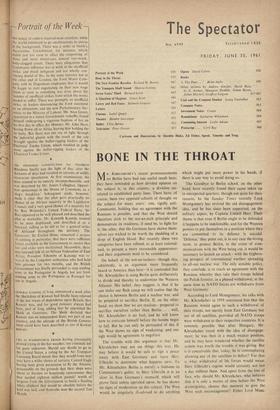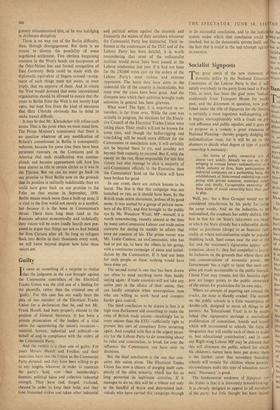BONE IN THE THROAT
MK. Kuausucitt,v's recent pronouncements on Berlin have had one useful result here; they have reminded us how divided opinion on
the subject is, in this country, a division un- related to established party lines. There have, of course, been two opposed schools of thought on the subject for many years: one, rigidly anti- Communist, holding that no agreement with the
Russians is possible, and that the West should therefore stick to the not-an-inch principle and demonstrate its readiness, if need be, to fight for it;.the other, that the Germans have shown them- selves too wicked to be worth the shedding of a drop of English blood. But recently these two categories have been refined, or at least rational- ised, to present a more reasonable appearance; and their arguments need to be considered.
On behalf of the not-an-inchers—though this, admittedly, is an argument more frequently heard in America than here—it is contended that Mr. Khrushchev is using Berlin quite deliberately to divide and thereby to undermine the Western Alliance. His belief, they suggest, is that if he can make our flesh creep we will realise that the choice is between Berlin and a nuclear war, and be prepared to sacrifice Berlin. lf, on the other hand, we show that we are resolute—prepared to sacrifice ourselves rather than Berlin . . . well, Mr. Khrushchev is no fool, and he will know how to extricate himself before the bombs begin to fall. But he can only be persuaded of this if the West shows no sign of weakening; and one sign would be agreement to negotiate.
The trouble with this argument is that Mr. Khrushchev may not see things this way. He may believe it would be safe to sign a peace treaty with East Germany and leave Herr Ulbricht to determine what happens next. I o Mr. Khrushchev Berlin is merely a tishbone in Communism's gullet; to Herr Ulbricht it is an ulcer in East Germany's stomach, which will prove fatal unless operated upon; he has shown no signs of moderation on this subject. The West would be singularly ill-advised to do anything which might put more power in his hands, if there is any way to avoid doing so.
The Goodbye to Berlin school, on the other hand, have recently found their cause taken up in unexpected quarters; though not quite for their
reasons. In the Sunday Times recently Lord Montgomery has revived the old disengagement idea, and he has since been supported, on the
military aspect, by Captain Liddell Hart. Their theme is that even if Berlin ought to be defended
it happens to be indefensible, and for the Western powers to put themselves in a position where they are committed to its defence is suicidal. 'Defence,' they point out, is in any case the,wrong term; to protect Berlin, in the event of com- munications with the West being cut, it would be necessary to launch an attack—with the frighten- ing prospect of conventional warfare spreading to all-out nuclear war. The only sensible policy, they conclude, is to reach an agreement with the Russians whereby they take their troops behind the Polish frontier, in a phased withdrawal, at the same time as NATO forces are withdrawn from West Germany.
According to Lord Montgomery, his talks with Mr. Khrushchev in 1959 convinced him that the Russians would agree to such a withdrawal of their troops, not merely from East Germany but out of all satellites, provided all NATO troops were withdrawn to their respective countries. It is remotely possible that after Hungary, Mr. Khrushchev toyed with the idea of disengage- ment: he was then in a much weaker position, and he may have wondered whether the satellite system was worth the trouble it was giving. But is it conceivable that, today, he is contemplating allowing any of the satellites to defect? For that is what withdrawal of his forces would mean. Herr Ulbricht's regime would certainly not last a day without them. And apart from the loss of face, why should Mr. Khrushchev, who believes that it is only a matter of time before the West disintegrates, choose this moment to give the West such encouragement? Either Lord Mont- gomery misunderstood him, or he was indulging in deliberate deception.
There is no way out of the Berlin difficulty, then, through disengagement. But there is no reason to dismiss the possibility of some negotiated settlement. Two obvious bargaining counters in the West's hands are acceptance of the Oder-Neisse line and formal recognition of East Germany. Both could be made with the diplomatic equivalent of fingers crossed—accep- tance of such things must not mean, or even imply, that we approve of them. And in return the West would demand that some international organisation should be allowed to ensure that the route to Berlin from the West is not merely kept open, but kept free from the kind of measures that Herr Ulbricht obviously has in mind to make transit difficult.
It may be that Mr. Khrushchev will refuse such terms. That is the point when we must stand firm. The Prime Minister's reassurance that there is no question whatever of any modification of Britain's commitment in Berlin is consequently welcome, because for some time there have been persistent rumours on the Continent and in America that such modification was contem- plated; and because appeasement talk here has been almost as rife in certain circles as it was in the Thirties. But we, can no more go back on our promise to West Berlin now on the grounds that its position is militarily indefensible than we could have gone back on our promise to the Poles on that excuse in September, 1939. Berlin means much more than a built-up area; it is vital to the free world not merely as a symbol, but because it is the bone in Communism's throat. There have long been (and as the Russians advance economically and technically their voices will be more loudly heard) men pre- pared to argue that things are not so bad behind the Iron Curtain after all. So long as refugees flock into Berlin in their thousands every week, we will know beyond dispute how false those voices are.



































 Previous page
Previous page